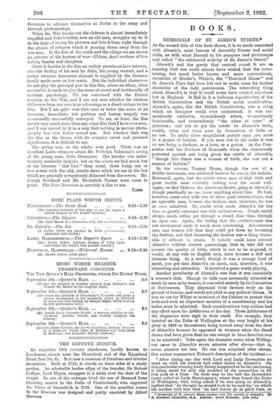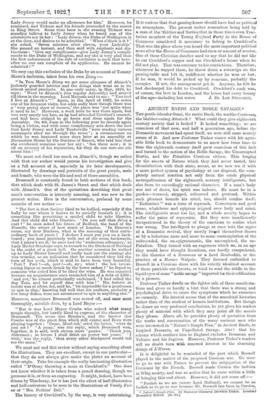BOOKS.
MEMORIAM OF ST. JAMES'S STREET.* As the second title of this book shows, it is as much concerned with Almack's, most famous of Assembly Rooms and social clubs, as with what Disraeli in his pompous and picturesque way called " the celebrated activity of St. James's Street."
Almack's and the gossip that centred round it are so amusing that one could almost have wished that the enter- taining, but much better known and more conventional. chronicles of Brooks's, White's, the " Thatched House " and St. James's Place had been left out to make room for further chronicles of the lady patronesses. The interesting thing about Almack's is that it could never have existed anywhere but in England. It Ead in it a ballroom reproduction of the British Constitution and the British social stratification. Almack's, again, like the British Constitution, was a thing which no foreigner could ever understand. It was tre- mendously exclusive, tremendously select, tremendously fashionable, and tremendously " the place of arms " of grandees ; and yet to get the entree to Almack's birth, wealth, titles and fame were by themselves of little or no use. To make those magnificent portals open you must be a person of fashion. If you were not in the mode it was no use being a duchess, or a hero, or a genius. As the Com- mittee told the Duchess of Newcastle when she clamorously protested against not being given the entree of Almack's, " though Her Grace was a woman of birth, she was not a woman of fashion."
In the reverse, Tommy Moore, though the son of a Dublin tradesman, was admitted because he was in the fashion. Brummell, again, had the entree when men of high birth and great wealth were wistfully looking over the social wall. Again, we find Ticknor, the American diarist, going to Almack's, though practically no one knew anything about him. He had, however, come over with two or three good introductions, was an agreeable man, became the fashion, and, therefore, he was at once admitted. No doubt what made Almack's for the time so greatly esteemed was this exclusiveness. People would always much rather get through a closed door than through an open one. Again, the feeling that the exclusiveness was not mechanical made it much more interesting. Adventurous men and women felt that they could get there by becoming the "fashion. and that becoming the fashion was a thing attain- able if difficult to attain. If nobody could have entered Almack's without sixteen quarterings, that is, who did not
possess the quality of birth, which is not to be acquired, it would, at any rate to English eyes, have become a dull and tiresome thing. In a word, though it was a strange kind of
merit, you got into Almack's on merit, and, therefore, it was interesting and attractive. It involved a game worth playing. Another peculiarity of Almack's was that it was essentially
a women's club. Though its balls were necessarily attended as much by men as by women, it was ruled entirely by its Committee
of Patronesses. They dispensed their favours truly on the ground of fashion, and would not yield to any political claims. It was no use for Whips or members of the Cabinet to protest that such-and-such an important member of a constituency and his ladies must be admitted. Such considerations very seldom had any effect upon the Arbitresses of the day. These Arbitresses of the elegancies were rigid in their creed. For example, they insisted on the Duke of Wellington at the very height of his glory in 1816 or thereabouts being turned away from the door of Almack's because he appeared in trousers when the dread decree had been given that no one except in knee-breeches was to be admitted I Take again the dramatic scene when Welling. ton came to Almack's seven minutes after eleven—that is, seven minutes too late. No one was admitted after eleven. Our author summarizes Ticknor's description of the incident :-
" After dining one day with Lord and Lady Downshire he went on with his hostess and other ladies to Almack's. On this particular evening Lady Jersey happened to be the patroness, it being usual for only one member of the committee to fill this post at a time. On their way to the ball the Downsides party called at Lady Mornington's, where they found the Duke of Wellington, who, being asked if he was going to Almack's, replied that he thought he should look in by-and-by,' on which his mother told him that ' he had better go in good time, as • Memorials of St. James's Street, together with The Annals of Alma*, RsR. Bereeford Chancellor, ILL. London: Grant Richards. [15s. net.]
Lady Jersey would make no allowance for him.' However, he remained, and Ticknor and his friends proceeded to the rooms in King Street. Some time later in the evening Ticknor was standing talking to Lady Jersey when he heard one of the attendants say to her : Lady Jersey, the Duke of Wellington is at the door, and desires to be admitted.' What o'clock is it ? ' she asked. Seven minutes after eleven, your Ladyship.' She paused an instant, and then said with emphasis and dis- tinctness : Give my compliments—give Lady Jersey's compli- ments to the Duke of Wellington, and say she is very glad that the first enforcement of the rule of exclusion is such that here- after no one can complain of its application. He cannot be admitted 1 "
We may cap this exclusion of the Duke by an account of Tommy Moore's inclusion, taken from his own Diary :- " In Tom Moore's Diary we get some glimpses of Almack's jealously guarded interior and the doings that went on in its almost sacred precincts. In one early entry, in May, 1819, he says : ' Went to Almack's (the regular Assembly) and stayed till three in the morning. Lord Morpeth said to me : " You and I live at Almack's." ' Again, in the April of 1822, he notes one of his frequent visits, but adds sadly that though there was very pretty show of women,' the place was not quite what it used to be. However, a week later he was there again, but was very nearly too late, as by had attended Catalani's concert, and had been obliged to go home and dress again for the Assembly. On 4th June in the following year he records again being a visitor, and with some complacency sets down the fact that Lady Jersey and Lady Tankerville ' were sending various messengers after me through the room' ; a circumstance on which he was bantered some days later at an assembly at Devonshire House by the Duchess of Sussex, who told him that she overheard someone near her say : See them now ; it is all on account of his reputation, for they do not care one pin about him ! ' " We must not dwell too much on Almack's, though we rather wish that our author would pursue his investigation and give us a full account of it, especially in its later developments, illustrated by drawings and portraits of the great people, male and female, who were the life and soul of those assemblies.
Brummell is constantly found in both sections of this book, that which deals with St. James's Street and that which deals with Almack's. One of the quotations describing that great man's conversation is intensely amusing, and was new to the present writer. Here is the conversation, prefaced by some remarks of our author :-
" The fact is that Society liked to be bullied, especially if the bully be one whom it knows to be socially beneath it ; it is something like permitting a spoiled child to take liberties. And this child did take liberties. Do you call that thing a coat ? ' he once asked his Grace of Bedford, the head of the Russells, the owner of how much of London. ' In Heaven's name, my dear Duchess, what is the meaning of that extra- ordinary back of yours ? I declare I must put you on a back- board ; you must positively walk out of the room backwards, that I mayn't see it,' he once had the audacious affrontery,' as Lady Hester Stanhope says, to remark to the Duchess of Rutland in the midst of a great ball. On another occasion he walked up to Lady Hester himself and coolly took out the earrings she was wearing, as an indication that he considered they hid the turn of her neck, which is said to have been very beautiful. Port ? Port ?—oh, port I—oh, ay ; what the hot intoxi- cating liquor so much drunk by the lower orders ? ' he lisped to someone who asked him if he liked the wine. He was annoyed because an acquaintance once reminded him of a debt of £500 ; and yet,' he almost pathetically exclaimed, ' I had called the dog Tom,- and let myself dine with him ! ' His batterie de toilette was of silver, for, said he, "tis impossible for a gentleman to spit in clay,' knowing full well that his auditors, probably a few stray dukes, were not accustomed to spit in anything else."
However, sometimes Brummell was scored off, and once most thoroughly, mirabile dictu, by a Lord Mayor :- " But it was Lord Mayor Combo who voiced what many people thought, but hardly liked to express, of the character of Brummell. The scene was Brooks's, and the brewer (for Combo was of the great firm which still exists) and Beau were playing together : Come, Mash-tub,' cried the latter, what do you set ? " A pony,' was the reply, which Brummell won, together, it is said, with eleven more ponies." Thank you, Alderman ; in future I shall drink no porter but yours.' I wish,' was the reply, that every other blackguard would tell me the same.' " We must not end this review without saying something about the illustrations. They are excellent, except in one particular— that they do not always give under the plates an account of their origin. Take for example the really fascinating illustration called " D'Orsay throwing a main at Crockford's." One does not know whether it is taken from a pencil drawing, though we presume it is, or from an engraving. It might, indeed, have been drawn by Tlia,ckeray, for it has just the effect of half-illustration and half-caricature to be seen in the illustrations of Vanity Fair or of " Mrs. Perkins' Ball."
The history of Crockford's, by the way, is very entertaining. It is curious that that gaming-house should have had so political an atmosphere. The present writer remembers being told by a man of the 'thirties and 'forties that in those times even Trac- tarian members of the Young England Party in the House of Commons considered it necessary to belong to Crockford's, That was the place where you heard the most important political news after the House of Commons had risen or was out of session. One of these Christian dandies used to say that he did not like to eat Crockford's supper and use Crockford's house when he did not play. That was contrary to his convictions. Therefore, whenever he supped there, he threw down a sovereign on the gaming-table and left it, indifferent whether he won or lost. If he won, it would be picked up by someone, probably the croupier. If not, the management got it. Anyway, he felt he had discharged his debt to Crockford. Crockford's cook was, of course, the best in London, and the house had every luxury



































 Previous page
Previous page